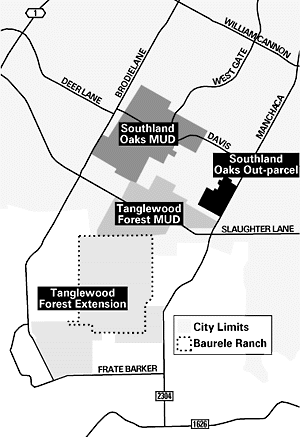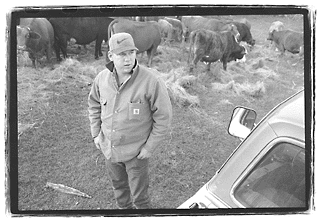Good Fences?
Annexation Treads on Texas Tradition
By Kayte VanScoy, Fri., Nov. 28, 1997
|
|
It's been a good year, plenty of rain, so rancher Brian Baurele isn't sure if his herd is going to remember the "come and get it" signal. He hasn't had to feed the cows from baled hay in months. "Ooooweee," he calls over the tops of the cedar and mesquite, honking his truck horn again and again. Finally a "moooo" floats back from the distance, an eerie echo of the horn's timbre, and 10 burnt orange cows appear over the crest of the nearest hill. Before you know it, most of the other 50 head of cattle emerge and Baurele is surrounded by chewing, mooing cows in all directions. Darkening this serene pastoral picture is the fact that Baurele and his family are surrounded by more than just the cattle they keep on the 505-acre tract of unadulterated Texas landscape in far South Austin. They are being roped in by the Austin City Council's most ambitious annexation drive ever.
A self-described "city kid in a cowboy world," Baurele, 25, is a third-generation rancher on the land his grandfather Robert Baurele bought in 1940 just south of Austin, past Slaughter Lane and east of Brodie Lane. When Robert Baurele died in 1982, the land passed into the joint ownership of Brian's father, Leon Baurele, and Brian's aunt, Joyce Felps. Aside from professional steer wrestling on the national rodeo circuit, cattle ranching is the sole support for the Baurele side of the family. "People don't understand it. They think I'm just backwoods and this and that, but this here's what I learned," says Brian. He went to city schools in South Austin and even played a little college baseball before dropping out several years ago. But the comfort and familiarity of the family business pulled Brian back to his rural roots. He explains, "I was always taught in life, if you have land you're gonna have money."
These days, though, ranching at the Baurele place is getting tougher. Residential subdivisions and major roadways border all sides of the comparatively empty property, and the family spends most of its time herding neighborhood kids, deer poachers, and three-wheelers off their land. "We were here before they were here," Brian protests. "The city's came this way -- we haven't come that way." According to city of Austin planners looking to expand Austin's tax base, that's precisely the point.
Since Mayor Kirk Watson's September 12 announcement that Austin would annex over 10,000 acres of land by year's end, the generic geographical clumps with mundane names coined by city planners -- names like "183 West" and "Southwestern Area" -- have become de rigeur for journalists, council, and city staff alike. But the Baureles took exception when their ranch turned up in the city's annexation sights as "Tanglewood Extension." Not only does the city intend to turn their cattle ranch into city-regulated land, but the staff didn't even have the decency to get the name right. And even city planner Ben Luckens, who came up with the "Tanglewood Extension" moniker, admits that Baurele is not an easy name for city planners to forget.
In the Thirties, before buying the ranch, Robert Baurele owned a grocery, a feed store, and a filling station along with quite a bit of open land near Kinney Avenue and South Lamar, in what is now the well-established Barton Hills neighborhood. A small street named Baurele still marks the family's contribution to the area. But more than that, the Baurele name is behind many of the deeds for municipal utility districts and subdivisions south of the city because Robert sold off large portions of the ranch for development during hard times in the Seventies.
Robert's mother came to Central Texas from Germany at age five as part of the mass German settlement of the region in the late 19th century. Robert married Edith Schwartz, whose family owned a large dairy east of what is now Slaughter Lane, and according to Joyce Felps the couple "worked themselves to death" clearing the Baurele ranch land of mesquite to make way for running cattle. "Of course my parents never dreamed that the city would grow and come out this far," Felps says. But come the city did. Brian's father, Leon Baurele, admits that running the ranch so close to town these days creates problems. "It is a hassle but my mother and father wanted us to continue ranching that land," he says. "Out of respect for them," his wife Cyndi finishes his sentence.
Brian explains that family tradition is the reason the city's annexation push is such a slap in the face. "You get upset because [the ranch] has been in the family so long and my grandmother and grandfather worked so hard to get what they got," he says. "You get upset that people can just come in and do what they want with it."

Luckens assures the Baureles that the annexation of their property "won't effect their lifestyle at all." However, if the Baurele's ranch is annexed, many of the family's daily activities will have to change. Burning brush to clear cattle-grazing grass land will be illegal. Luckens suggests that the family might be treated as a special case by the fire department, but there are no guarantees, especially with subdivisions surrounding the land. Firing rifles and shotguns is also illegal in the city limits, but the Baureles rely on guns for deer and dove hunting, not to mention rattlesnake insurance. However, ranching and farming are technically legal within the city limits, and Luckens argues that the annexation should be no cause for alarm.
Luckens also points out that because the land will continue to be assessed by agriculture production value as opposed to property value, the family's taxes will not dramatically increase. The Baureles argue that because the ranch provides virtually no tax base, annexation is a pointless burden on both Austin and their family. "The only thing it's gonna be doing is hurting us," Brian says.
The city, however, sees things quite differently. Luckens says the city decides which land to annex by how easily the land can be served by the city. "The Baurele Ranch has a 42-inch wastewater line running through it and can be served without any problem," says Luckens, referring to an easement that the family sold to the Shady Hollow subdivision, which abuts their property to the west. The family says they now regret selling the easement, as it floods and fills watering holes with moss. Their own homestead, built by Robert Baurele in 1945, is still serviced with well water and a septic tank.
More important to the city's decision to annex, though, is the land's projected future use. "Our assumption is that it will be developed at some point and if we wait till there are homes on it we're going to have to have hearings like every place else," Luckens says. "The other thing is we simply needed to have a connection to areas to the south."
That admission -- that the city is annexing the Baurele tract primarily so it can run a connection through the pristine property to service more populated areas -- is what got Cyndi Baurele's goat when she and her husband Leon showed up at last week's council meeting. "You're using us!" Cyndi fumed. "You would take away our lifestyle simply to be a vehicle to those people below us."
Cyndi demanded to know why the city didn't just annex the nearby residential areas to aide its southward march. Luckens explained that although the city does plan to annex those neighborhoods a few years down the line, providing sewage service would be more expensive to hundreds of homes than to the Baurele's single homestead. Besides, Luckens contended, their ranch was destined to be subdivided one day anyway. "What we're used to around here are people who can't wait to sell the family ranch. In 15 to 20 years," Luckens ominously predicted, "I hate to say it, but I have a feeling your child will have succumbed."
"I don't know about that," Cyndi glowered with a how-dare-you look. "I may be a mean old lady by then who says absolutely, positively no."
That Luckens would make the arrogant prediction that a Baurele offspring would automatically sell and subdivide the family's land doesn't sit well with the family. Brian, who stands to inherit the ranch jointly with Felps' daughters, vows there'll be no such deal. "Nope. Not unless I necessarily had to," he says. "It's been in the family too long." Besides, he explains, he is counting on the ranch to make his living, just as his parents are now.
Luckens says he is a little surprised at the Baureles' sudden opposition. He explains that, with only two and half working weeks to go before annexation is complete, negotiating with the Baureles would have been considerably easier if they had contacted him sooner. In fact, though, Joyce Felps did call Luckens in September, but by all accounts, the conversation was not very productive and left Felps furious with the city. Family members add that their silence is just what the city was counting on. "I should have gone and talked to somebody," Leon now reckons. "But we are country people and I haven't been known to go and complain."
And although Felps seems plenty able to speak up, she is similarly frustrated. "There's just the two of us and two against hundreds doesn't make much of an impression. We can't make enough noise," she says.
Despite their reticence, the Baureles decided to testify at the council's public hearing -- with Luckens' encouragement -- to try to negotiate the annexation of only a thin strip of the ranch, which would allow the city to run services to neighborhoods further south without annexing all of the tract. In his unassuming way, Leon quietly laid out his family's problem to council, but no one on the dais seemed to be paying much attention. At one point during the short speech, Watson cocked his head at Leon with interest, but was soon distracted by conversation among other councilmembers.
After the Baureles sat back down, Assistant City Manager Toby Futrell said, "We need to spend some time and look at this, and I will contact you." The public hearing continued without further comment. At press time, no such contact had been made. Welcome to Austin.
Got something to say on the subject? Send a letter to the editor.









